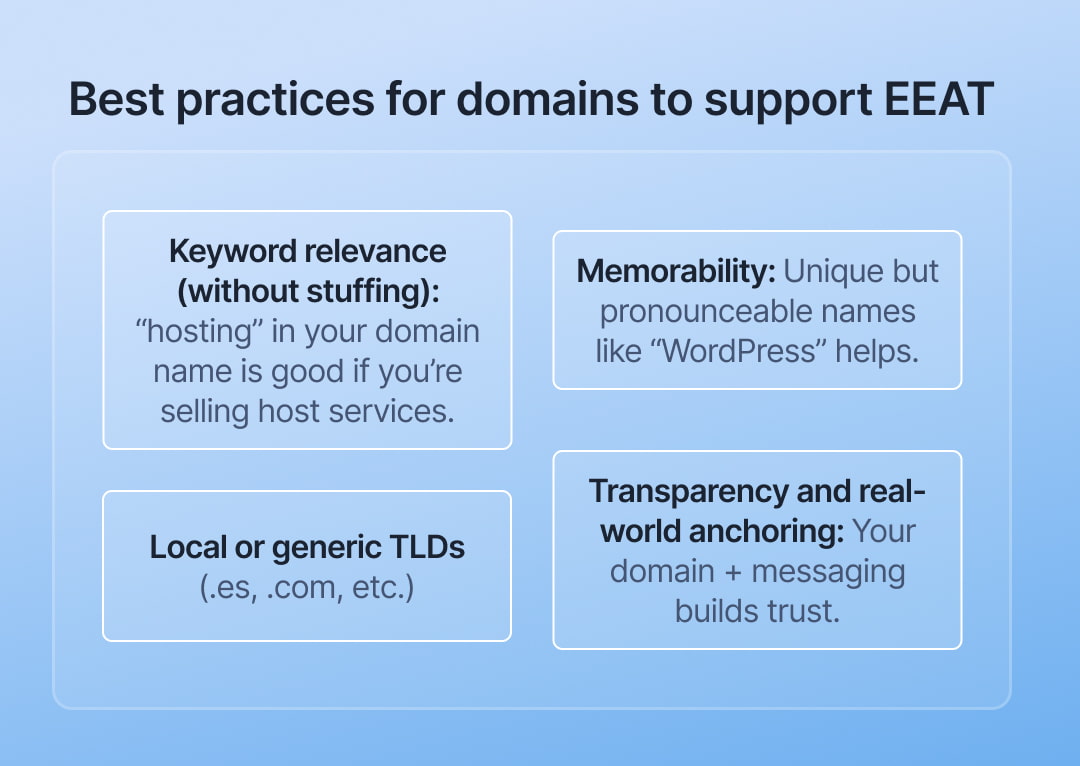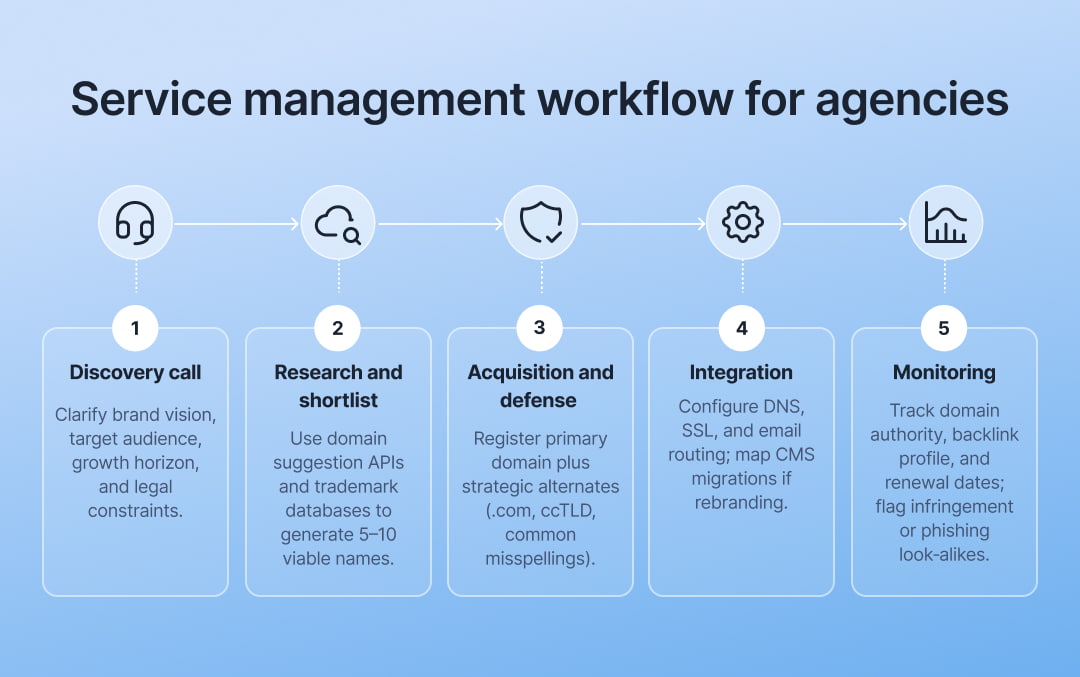Compounded data samples on US-based small businesses and republished by Hostinger in 2025 expose how 27% of small businesses don’t have a website yet, but the vast majority of them (87%) are planning to create one in the near future.
And, with the website being the primary digital point of contact of modern businesses, choosing memorable domain names is the step that can mark the difference between a thriving online presence and digital obscurity.
What makes a domain name “memorable”?
A memorable domain name is one that’s easy to recall, spell, and share. It creates instant recognition and forms the foundation of your digital brand identity. While creativity is important, clarity often wins: a domain should reflect your business name, niche, or offering without confusion.
There are several traits that contribute to memorability:
- Simplicity: avoid complex words, numbers, or hyphens. Domains like FreshBooks.com or Canva.com are easy to say, spell, and remember.
- Length: short domain names tend to perform better. They’re quicker to type, less prone to errors, and easier to recall.
- Relevance: a domain that aligns with your brand name, industry, or product offering is more intuitive for users to remember and trust.
- Originality: unique and brandable names stand out in a sea of generic domains. These often become synonymous with the business itself—think Spotify or Shopify.
- Phonetic clarity: if someone hears the domain spoken aloud, they should be able to write it down without asking for the spelling.
Why memorable domains are critical for small businesses
Small businesses must capitalize on every opportunity to stand out.
Thus, a memorable domain isn’t just a nice-to-have, but a foundational element that supports branding, marketing, and customer trust.
While large enterprises may rely on reputation or advertising budgets, smaller companies often rely on first impressions, and the domain name is often the very first touchpoint.
First impressions and brand identity
Your domain is your digital front door, and first impressions matter. Research from the Stanford Web Credibility Project shows that 75% of users admit they judge a business’s credibility based on website design and domain.
A poorly chosen or hard-to-remember domain can create doubt in a potential customer’s mind before they’ve even explored your offering.
A memorable domain supports your brand identity in several ways:
- It reinforces your business name and message: When your domain matches or complements your brand, it strengthens recognition across platforms.
- It sets the tone for your professionalism: Just like a polished storefront or well-designed logo, a clear and concise domain signals legitimacy and reliability.
- It differentiates you from competitors: In crowded niches, a strong domain helps carve out your space and prevents confusion with similarly named businesses.
For small businesses, trust is currency. A domain name that’s simple, relevant, and professional helps earn that trust from the very first interaction.
Word-of-mouth and shareability
A memorable domain name doesn’t just live on the screen: it lives in conversations, print materials, and customer recommendations.
Thus, a domain name that’s easy to recall and repeat becomes a silent ambassador for your brand.
Whether a customer is recommending your business over coffee, sharing your website during a phone call, or mentioning it on social media, a clean and intuitive domain name reduces friction in that exchange. Compare saying “visit my site at GreenHarvestMarket.com” to spelling out something like “Green-Harvest-Store123.biz”—the difference in clarity is enormous.
Memorable domains also enhance offline promotion, including:
- Radio or podcast ads: Listeners need to remember the URL without seeing it written down.
- Business cards and signage: The domain must be concise enough to fit neatly and look professional.
- Networking and referrals: People are more likely to visit and share URLs they can remember easily.
In short, the easier your domain is to recall, the more likely it is to be repeated, where repetition builds awareness, traffic, and trust.
Improved search engine performance
While domain names alone don’t directly determine rankings, they play a key role in supporting broader SEO strategies, especially through trust signals and branding.
For small businesses trying to improve their visibility in organic search, a memorable and brandable domain can make a measurable difference.
Furthermore, Google’s quality guidelines emphasize the importance of EEAT (Experience-Expertise-Authoritativeness-Trustworthiness), a framework used by Google to evaluate the quality of content and websites.
It doesn’t directly affect rankings like an algorithmic factor, but deeply informs how Google assesses content credibility.
But, how does each EEAT factor connect to a domain name?

1. Experience
- Definition: shows that the content creator has personal experience with the topic.
- Domain relevance:
- Domains that reflect practical usage, real-world connection, or clear scope enhance perceived experience.
- If your domain matches your industry or process, it can suggest that the business has a grounded, “hands-on” perspective.
2. Expertise
- Definition: demonstrates high-level knowledge or skill in a particular field.
- Domain relevance:
- Domains that are niche-specific, clear, and not overly generic help build expert perception.
- “WebhostingXYZ” immediately positions itself as an expert business in hosting, with a unique conceptual angle that will depend on the name.
3. Authoritativeness
- Definition: the extent to which the site or content creator is known as a go-to source.
- Domain relevance:
- Authority builds over time, but the right domain helps establish brand recall and topical alignment.
- A brandable, memorable, and keyword-aligned domain name can help attract the right link (together with a solid backlinking strategy) to create signals of authority, amplified by do-follow links, mentions, and digital PR.
- Domains that are clear about their niche and value help earn trust from both users and algorithms.
4. Trustworthiness
- Definition: how reliable and accurate the content and website are.
- Domain relevance:
A clean, relevant domain name can contribute to these signals.
Best practices for domains to support EEAT
| Keyword relevance (without stuffing) → “hosting” in your domain name is good if you’re selling host services. | Memorability → Unique but pronounceable names like “WordPress” helps. |
| Local or generic TLDs (.es, .com, etc.) | Transparency and real-world anchoring → Your domain + messaging builds trust. |
Consistent branding across channels: reinforce the domain in emails, social bios, structured data, and knowledge graphs.
Pro tip – measure your digital brand authority
A concise, professional domain shows that your business is legitimate and committed to long-term credibility. Use integrated tools like Moz, Semrush or Ahrefs to measure your Domain Authority.
Conversion and user trust
A memorable domain name builds confidence.
Visitors make split-second decisions about whether to stay on a website or bounce, and the domain name is part of that decision-making process.
If the URL looks suspicious, overly long, or difficult to read, potential customers may hesitate to engage or avoid clicking altogether.
Here’s what to aim for when choosing a domain name for your clients or your business itself:
Professional appearance
short, brandable domains suggest that the business is established and has invested in its online presence.
Increased click-throughs
People are more inclined to click on URLs that seem familiar, reputable, or aligned with what they’re searching for.
Lower bounce rates
When users trust a domain, they’re more likely to explore the content and take action, whether it’s signing up, making a purchase, or contacting the business.
Stronger recall during buying decisions
Even if a user doesn’t convert on the first visit, a memorable domain makes it easier for them to return when they’re ready to buy.
Ultimately, your domain name plays a psychological role in how users perceive your brand. When it feels safe, reliable, and easy to remember, it lowers resistance and increases the chances of turning interest into action.
How resellers and agencies can guide clients to the right domain
Resellers and digital agencies sit at the intersection of branding, technology, and growth.
Your value lies in turning domain selection from a confusing chore for business owners into a strategic asset.
So, when it comes to domain names, what should you pay attention to in order to make small businesses’ lives easier?
Information overload and analysis paralysis
Clients struggle with thousands of TLD options, trademark conflicts, and mixed advice from blogs.
- Agency value: provide a curated shortlist based on industry, geography, and brand tone. Use data (search volume, competitor gap analysis) to justify each recommendation.
Fear of Missing Out on the “perfect” name
Scarcity and aftermarket prices make clients worry a better domain will appear tomorrow.
- Agency value: explain opportunity cost and secure close variants for defensive registration. Offer phased strategies: launch with the best available domain now, monitor premium auctions for upgrades later.
Brand‑message misalignment
Technical founders often choose clever but confusing names that don’t resonate with target audiences.
- Agency value: facilitate brand workshops, test shortlist domains in paid‑search or social ads, and present engagement metrics to prove which name sticks.
SEO and Trust Concerns
Clients read that keywords matter yet fear looking spammy.
- Agency value: balance brandable roots with subtle topical cues (e.g., “petcare” vs. “pet‑supplies‑online‑cheap”). Show how short, brandable domains earn more backlinks and higher click‑through rates.
Technical Complexity and Ongoing Management
DNS, SSL, and renewal cycles feel daunting.
- Agency value: bundle domain, DNS, and security under one managed service. Offer automated renewal monitoring and alerts to prevent costly lapses.
Service management workflow for agencies

- Discovery call
Clarify brand vision, target audience, growth horizon, and legal constraints.
- Research and shortlist
Use domain suggestion APIs and trademark databases to generate 5–10 viable names.
- Acquisition and defense
Register primary domain plus strategic alternates (.com, ccTLD, common misspellings).
- Integration
Configure DNS, SSL, and email routing; map CMS migrations if rebranding.
- Monitoring
Track domain authority, backlink profile, and renewal dates; flag infringement or phishing look‑alikes.
Why Openprovider is ideal for securing brandable domains
For agencies, hosting companies, and resellers that want to deliver memorable, growth‑ready domains without hidden costs or administrative headaches, Openprovider stands out as the partner of choice, where you can access:
- The exclusive Memberships to get wholesale pricing model on domains
- A vast catalog of TLDs, including ccTLDs like .nl and new gTLDs like .ai
- API access for bulk domain operations
- Our free RCP platform to manage all of your digital assets in one place


